
Written by Caroline Stone
Manuscript courtesy of the Cambridge University Library
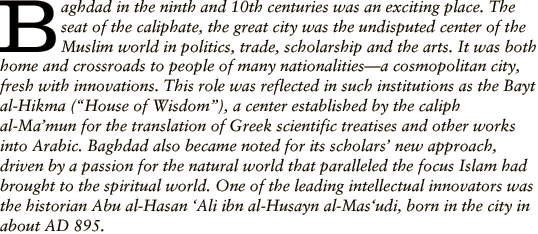
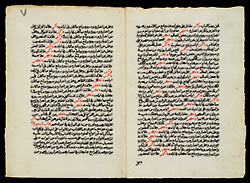 Earlier and more traditional Muslim historians such as al-Tabari, whom al-Mas‘udi greatly admired, collected vast quantities of material and set it down in roughly chronological order. Each piece was supported by its chain of transmission—“I had it from x, who had it from y, who was present at z when such and such happened”—exactly as was done with hadith, the “traditions” of the actions and sayings of the Prophet Muhammad. Such compilations were comprehensive but unreadable. The “new school” of al-Dinawari and al-Ya‘qubi, two other ninth-century scholars, improved on this method, favoring a continuous, selective narrative. Al-Mas‘udi built on their ideas, adding as much firsthand knowledge as he could, particularly with regard to foreign countries and contemporary events. More than any other Muslim historian, al-Mas‘udi tried to keep his books lively with stories and anecdotes, and this gave him great appeal to readers in his day.
Earlier and more traditional Muslim historians such as al-Tabari, whom al-Mas‘udi greatly admired, collected vast quantities of material and set it down in roughly chronological order. Each piece was supported by its chain of transmission—“I had it from x, who had it from y, who was present at z when such and such happened”—exactly as was done with hadith, the “traditions” of the actions and sayings of the Prophet Muhammad. Such compilations were comprehensive but unreadable. The “new school” of al-Dinawari and al-Ya‘qubi, two other ninth-century scholars, improved on this method, favoring a continuous, selective narrative. Al-Mas‘udi built on their ideas, adding as much firsthand knowledge as he could, particularly with regard to foreign countries and contemporary events. More than any other Muslim historian, al-Mas‘udi tried to keep his books lively with stories and anecdotes, and this gave him great appeal to readers in his day.
Though some modern commentators have called this characteristic frivolous, the
criticism is unfair. Al-Mas‘udi’s digressions not only lighten his sometimes interminable accounts of internecine wars, but he also used them to make subtle points: A seemingly irrelevant story of a caliph’s behavior as a child will foreshadow how, a hundred pages later, the same man faced death; or the rebelliousness of a slave girl will foretell future rebellion in the state. A close reading of al-Mas‘udi reveals that he is a master storyteller, and in examining his technique, it is wise to assume that every detail is significant. One would also need to be hard-hearted to wish that he had left out some of his marvelously romantic stories: the picaresque life of the caliph’s son, Ibrahim ibn al-Mahdi; the rise and fall of the Barmakid family, a tale that rivals Greek tragedy; or the footnotes to the life of Caliph Harun al-Rashid, whom we know today from the Thousand and One Nights. This all makes al-Mas‘udi the most entertaining and charming of the classical Arab historians, and he has been compared with good reason to Herodotus.
About al-Mas‘udi himself, however, strangely little is known. The lack of information is all the stranger in that al-Mas‘udi, by his own account, was a native of Baghdad and knew many writers and scholars, some of whom mined his works for such purposes as providing entries in their biographical dictionaries. Yet those same dictionaries dedicate little, if any, space to him in return. Our knowledge of al-Mas‘udi, therefore, relies almost entirely on what he tells us, which is precious little. He reveals nothing directly of his private life, his social position, his profession or the sources of his income—though we can reconstruct or deduce a small amount. On intellectual matters, however, he is more open, and it is possible to learn a good deal of his tastes, opinions and prejudices, his attitudes toward historiography and scholarship, and his friendships with other eminent men of his day.
Ibn al-Nadim, the Baghdad bookseller who lived from ad 935 to 990, mentions him in his Fihrist—essentially a detailed book catalogue—which was written some 30 years after al-Mas‘udi’s death. Unfortunately, the information he gives is sketchy and largely incorrect, but he does mention a number of his works, including the one for which he
is best known, Muruj al-Dhahab, The Meadows of Gold. Even the exact years of al-Mas‘udi’s birth and death are uncertain; he must have been born about 895 and died
in 956 or 957. His professional status is also unknown, but he was a prolific writer: He mentions 34 of his own works that have not survived down to our time, two of them massive compilations that are frequently—and maddeningly—referred to in The Meadows of Gold. For example, he writes this at the end of the chapter on China:

Also among the books that have vanished there appear to have been a further four major historical works, while the others were largely theological and philosophical, with one or two on science, geography and travel. Fortunately, his masterpiece, The Meadows of Gold, is one that has survived. It seems to have been completed, at least in a first version, by AD 947, but al-Mas‘udi apparently revised it repeatedly almost until his death. Ibn Khaldun, the great North African historian and philosopher of history, wrote this about The Meadows of Gold more than 400 years later:
“History consists of the recording of the particular events of an era or a generation. The general conditions of far-away places, generations and eras constitute a basis for the historian on which most of his objectives are built and according to which his reports are classified. Men once devoted themselves to this genre of writing, as did al-Mas‘udi in his Meadows of Gold, in which he explained the conditions of nations and far-away places, both East and West, down to his own days.… He mentioned their creeds and customs, described countries, mountains, seas, kingdoms and states, and distinguished Arab from non-Arab nations. He thus became an imam [a model] for historians who refer to him, and a source upon which they depend to verify many of their reports.”
The Meadows of Gold combines two of al-Mas‘udi’s great interests: history and geography. He covers, in the traditional medieval manner, the history of the world, from the creation up to his own century, with a wealth of stories and anecdotes drawn from other scholars or from his own experience. The mixture is glorious: a list of trees which, according to tradition, Adam and Eve were allowed to bring with them from Eden;
a description of Cleopatra’s death, uncannily foreshadowing Shakespeare, with whom al-Mas‘udi shared the same classical sources; the purple and gold books of the pre-Islamic rulers of Iran; a life of the Prophet Muhammad; exchanges of prisoners with
the Byzantines; a natural history of the elephant, both African and Indian, together
with reflections on the ivory trade; tragic love stories; the caliphs’ feasts, with recipes; and on, and on. The list is almost endless, and one by one the caliphs, even the most shadowy, warm to life.
The geographical sections, which are among the most interesting to modern readers, are either accounts of his own very far-flung travels or, where there are gaps in his
personal experience, accounts gleaned from sources he considered reliable. For example, referring to other scholars, he tells us that “their researches on the latitude of the earth have proved that the inhabited area extends from the equator as far north as Thule, beyond Britain, and there the longest day lasts 20 hours.”
Again, when discussing some methods of water divining, he quotes textbooks on agriculture. On the topic of India, he says of Jahiz—the great scholar, thinker and wit, of whom he elsewhere tells many admiring stories—

Al-Mas‘udi then recounts what those sources are. He is interesting to read for his accounts of his own travels, particularly to the Far East, Yemen and India, but he also went to a great deal of trouble to collect information about the Byzantine Empire and Greek culture in general. This is not surprising when one considers that Arab science and learning were in full flower and that their debt to the scholars of Greece was well-recognized. Furthermore, Byzantium was at that time the prime adversary of the Islamic world, and so naturally information about the country and its customs was of more than academic interest.
Al-Mas‘udi also made great efforts to find out as much as possible about remote areas of the world. This was clearly not easy, but he managed to glean a certain amount about the Slavs, for example, small numbers of whom traded regularly in Baghdad, as well as the other peoples of Central and Eastern Europe. There is a certain amount about Africa, but there he is more concerned with the geography and natural history, such as exports of panther skins, the habits of the rhinoceros and the course of the Nile, than he is with the customs of the people. This is slightly surprising, since the large number of African slaves in Baghdad would have made gathering information relatively simple. (It may have seemed too easy, too well-known to be worth setting down.) More surprising
is the lack of information on North Africa and Spain, which at that time was Muslim. He does say a little about Galicia, but clearly al-Andalus did not interest Baghdad as much as Baghdad interested al-Andalus.
Al-Mas‘udi’s aims are made clear to the reader in his address near the end of The Meadows of Gold:
“In this book, I have in very few words set down numerous happenings and have made brief mention of events of considerable importance. In any case, each of my works contains information omitted in the book that preceded it, information which could not be ignored and knowledge of which is of the greatest importance and a genuine need. Thus I have reviewed every century, together with the events and deeds which have marked it, up until the present. Furthermore, there is to be found at the beginning of this book a description of the seas and continents, of lands inhabited and uninhabited, of the lives of foreign kings, their histories and those of all the different peoples. If God gives me life, if He extends my days and grants me the favor of continuing in this world, I will follow this book with another, which will contain information and facts on all kinds of interesting subjects. Without limiting myself to any particular order or method of setting them down, I will include all sorts of useful information and curious tales, just as they spring to mind. This work will be called The Reunion of the Assemblies, a collection of facts and stories mixed together, to provide a sequel to my earlier writings and to complement my other works.

His remarks on the knowledge “that a wise man cannot ignore” have an interest for us that al-Mas‘udi could hardly have foreseen: A thousand years ago, what knowledge was a wise or otherwise educated man in Baghdad expected to have? The answer, if The Meadows of Gold is to be believed, is a great deal. Indeed, the range would be comparable to that expected today, but of course different in content: a little more theology and a little less technology, but perhaps not so different as one might expect.
Another aspect of The Meadows of Gold that interests us today, though not a primary concern of al-Mas‘udi’s, is the light it sheds on the social life and customs of his times. Islam, perhaps because of its emphasis on the community rather than the individual, is not a tradition rich in autobiography. Therefore, the passages in which
al-Mas‘udi describes such things as being received at a millionaire’s house for breakfast, fashions in architecture, the organization of a medical conference, the correct way to lay a table for a formal party or the functioning of the Baghdad police force are not only informative, but they help us to imagine, however dimly, a world which would otherwise at this distance seem to be mostly a matter of dates (often uncertain), battles (often indecisive) and political disagreements (often unresolved).
As we read through the whole of The Meadows of Gold, al-Mas‘udi’s character emerges with surprising clarity. Besides the breadth of his learning, the most striking thing is perhaps his tolerance. Al-Mas‘udi’s attitude to Christianity, Judaism, polytheism and heretical Muslim sects is above all one of curiosity, a wish to “set the record straight” and to inform his readers of the facts of each case insofar as he has been able to learn them. Though in Europe, in al-Mas‘udi’s time, intellectual activity was inconspicuous and hatred of the unorthodox or unfamiliar was rampant, al-Mas‘udi’s intelligence and lack of prejudice would have been remarkable in any time or place, and all the more so in a man who there is every reason to believe was devoutly religious.
Another aspect of al-Mas‘udi’s personality that his writings reveal is his distaste for cruelty. By the standards of the Middle Ages, or indeed our own time, The Meadows
of Gold is poor in horror stories, and where al-Mas‘udi describes the sack of a city or
the punishment of a traitor, he rarely dwells on detail, and not infrequently one senses the author’s disgust.
Al-Mas‘udi had a fine sense of humor, and he was an excellent raconteur. To some extent his stories are literary devices, but a number were about incidents he himself observed. There is also a suggestion of kindliness, for although al-Mas‘udi can tell a story against an individual—and he appears to have had a prejudice against the legal profession in general—the account is usually good-humored. Where he criticizes other writers and scholars, as we have seen in the case of al-Jahiz, he makes a point of tempering his remarks with praise. For example:
!["I consider that Sinan ibn Tabit ibn Qurrah al-Harrani undertook a task outside his competence and followed a path that was not his when he composed that book which he addressed to one of his friends, secretary to the Audience Chamber, in the form of a letter.... However well the work is carried out and however truthful the author, we can only blame him for having abandoned his own sphere and having taken on something for which he was unfit. Why did he not remain in the field of science, where he had no rivals in knowledge of Euclid, of the divisions of [Ptolemy's] Almagest or of circles? Why did he not develop the views of Socrates, Plato and Aristotle...? In this, he would have acquitted himself with honor and his abilities would have coincided with his undertaking. But where is the man who recognizes the limits of his strengths and the boundaries of his competence? 'Abd Allah ibn al-Mukaffa' has said with good reason, 'All authors pursue an aim; reaching it, they win glory; failing, they are dishonored.'"](/issue/200502/images/historians-quote-4.gif)
When it came to research and writing, al-Mas‘udi was, for all his occasional light-ness, greatly serious. The Meadows of Gold opens with a description of what he is setting out to do, a table of contents and a list of sources that is a kind of catalogue raisonnée, in which he gives particular praise to such men as al-Suli, who set down what they themselves had witnessed, together with those who showed particular breadth of interest and encyclopedic learning. He prefaces his list with the following remarks:
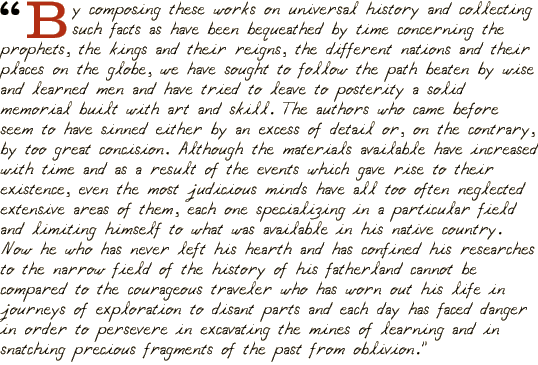
Al-Mas‘udi was clearly thinking of his own efforts and his own travels. The debate
on specialization versus broad knowledge is not peculiar to any era, and though our own time inclines to sympathize with the specialist, the 19th century—or for that matter the Renaissance—would have been entirely on al-Mas‘udi’s side.
He continues with a remarkable mix of rigor and generosity:

Al-Mas‘udi was, as he repeatedly says, scrupulous about quoting authorities (and he was anxious that he in turn should be credited), and he frequently qualifies statements by saying that he has been told such-and-such but has no way of verifying it. In the case of his geographical writings, he made every effort to go and see for himself. At the beginning of The Meadows of Gold, where he gives a bibliography of his own works, he writes:
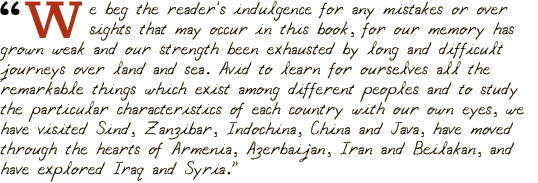
Two other small points are, perhaps, worth making. Al-Mas‘udi’s attitude to women is liberal, though indeed their status was high in Baghdad at that time. His pages are full of noble and admirable women of all kinds: Zubayda, the wife of Harun al-Rashid, famous for having endowed the pilgrimage road to Makkah that still bears her name; Layla al-Akhyaliyya, the great poet; Khayzuran (“the reed”), who rose from the slave market to become the power behind the throne; the warlike Um al-Banin; and a whole host of dancers, singing girls, slaves, market vendors, poets, mystics and even Christian nuns, who collectively serve to give a much more balanced picture of the world than the one presented by so many historians of the Middle Ages.
Secondly, his other surviving work, the Book of Instruction and Admonition, is less interesting than The Meadows of Gold to the general reader, although it does contain some biographical material and extremely important geographical information, some of it found nowhere else.
But The Meadows of Gold is far richer. Near its end, the author wrote:
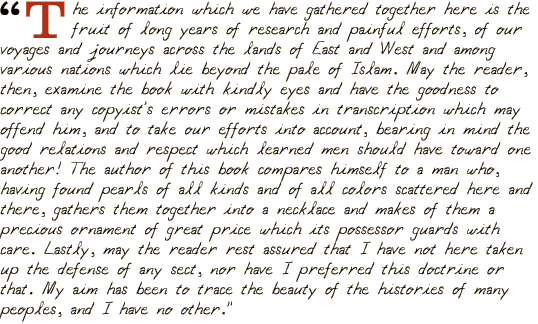
 |
Caroline Stone divides her time between Cambridge and Seville, and has recently returned from the Caucasus. She is currently working with Paul Lunde on a translation of selections from The Meadows of Gold for Penguin Classics as well as a volume on the journeys of Ibn Fadlan and other Arab travelers to the north, to appear in 2007. |





